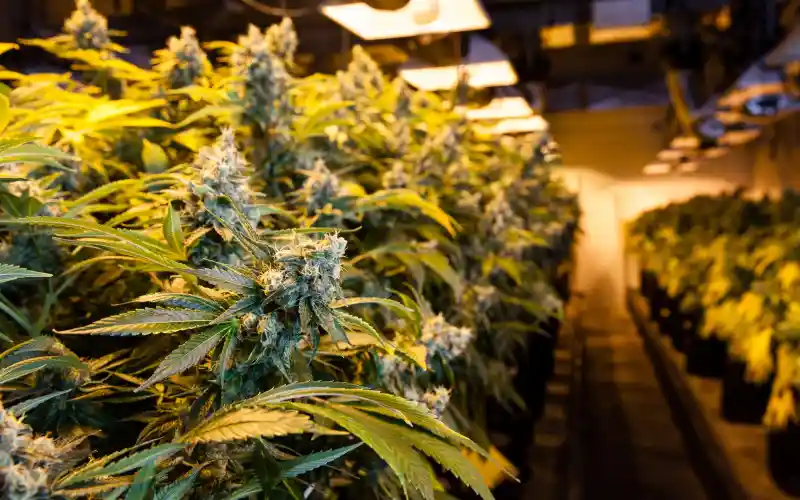Connect with us
Published
3 weeks agoon

Researchers from the University of Basel in Switzerland recently published a study on April 2 to analyze how medical cannabis legalization in the U.S. has affected the country and its patients’ well-being.
Entitled “Medical marijuana laws and mental health in the United States,” researchers wanted to determine the effects of medical cannabis policies on patients over time. “The consequences of legal access to medical marijuana for individuals’ well-being are controversially assessed,” researchers wrote. “We contribute to the discussion by evaluating the impact of the introduction of medical marijuana laws across U.S. states on self-reported mental health considering different motives for cannabis consumption.”
Researchers analyzed the responses of 7.9 million people who participated in phone surveys between 1993-2018. This information was collected through the Behavioral Risk Factor Surveillance System, which focuses on data collection regarding “mental well-being.” In addition to this, researchers also utilized data collected by the National Survey on Drug Use and Health.
Participants were placed in specific groups, such as those who were “highly likely to abstain from using marijuana, to use marijuana as a recreational drug, or to use it for medical reasons” in order to determine the overall affect of medical cannabis legalization on their mental health. Additionally, researchers took into account the use of cannabis specifically for overall chronic pain.
Mental health was measured by asking participants to self-assess themselves by recording how many days they encountered mental health problems during the month prior to the assessment.
Ultimately, researchers found that medical cannabis legalization had no effect on either recreational consumers or youth. “We find weak evidence of positive effects on mental health due to the liberalisation of medical marijuana for the U.S. population overall,” researchers wrote in their conclusion. “While the estimated overall reduction in poor mental health days is not statistically significant, the result still implies an absence of evidence for the critical perspectives that highlight the risk of aggravated mental health problems due to MML [medical marijuana laws] introductions.”
“Easier access improves the mental health of individuals who use marijuana for medical reasons,” stated a University of Basel press article. “The same applies to people who are very likely to suffer from pain. The study authors estimate that these two groups spend 0.3 days less per month in poor mental health due to the change in the law.”
Professor Alois Stutzer summarized these findings in his own statement as well. “Overall, our results show that medical cannabis legislation in the USA benefits the people it is intended for without harming other groups,” Stutzer said. He explained that recreational cannabis consumers aren’t worse off after legalization, either, and ultimately there is “a clear relationship between liberalization and mental well-being.”
Both the U.S. and Switzerland both share a federal government structure. While Stutzer calls the most recent study an “experimental article” because it can help pave the way toward more studies that analyze Switzerland’s future cannabis industry.
The most recent study only extended to data collected prior to 2018, so it would be interesting to see a future study analyze even more recent data that accompanies the many other states that have legalized medical and/or adult-use cannabis within the past five years.
Switzerland has been conducting isolated cannabis pilot programs to analyze consumer trends, sales patterns, and more. Recently at the end of March, the first data connected to one of these programs was released.
The ZüriCan study includes 1,928 people who have been approved to purchase cannabis for the study (a total of 2,100 individuals can participate). The newest data shared that of current participants, 80.7% are men, 18% are women, and 1% are nonbinary people. The demographic disparity was not a surprise, however, as researchers expected there to be a vast difference in gender-related consumers.
Additionally, researchers found that participants between the ages of 28-32 represented the highest percentage among all age groups (the average age of consumers is currently 35 years old). “Participation in the study seems to be particularly attractive for people who consume frequently,” researchers wrote. “However, people who only use cannabis a few times a month also take part in the study. This will allow us to compare people with different consumption habits in our study.”
The program data also showed that 6,500 sales have been made so far, with approximately 309 pounds of cannabis sold (individual packs were available only in five gram amounts).
Tobias Viegener, the head of marketing Cannavigia, a company that is working directly with the Swiss Federal Office on Public Health, told Forbes about the significance of this early data. “The initial data from the ‘ZüriCan’ pilot, published this month, reveals promising insights into the regulated cannabis market’s functionality and its acceptance among participants,” Viegener said. “This level of engagement indicates a positive reception and an effective distribution system, setting a solid foundation for informing future cannabis policy and regulation.”


Carmelo Anthony Launches Cannabis Brand


Santa Barbara County Approves Study To Address Ongoing Cannabis Odor


Kansas Medical Cannabis Proposal Dead for 2024


Psychedelic Research Proves Rather Tricky for the FDA


Psychedelic Drug Market Poised to Hit $4.6B by 2030


Chronic Pot Use Has Minimal Effect on Motivation, Study Shows
